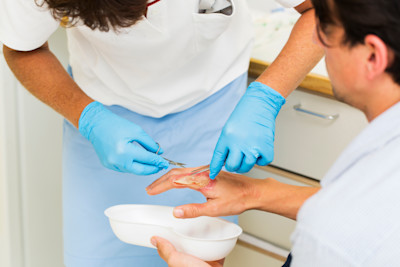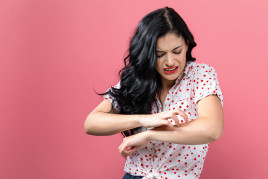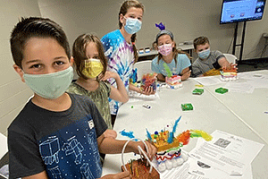Proper wound care: How to minimize a scar
Proper wound care: How to minimize a scar
Whenever your skin is injured – whether by accident or from surgery – your body works to repair the wound. As your skin heals, a scar may form, as this is a natural part of the healing process.
Here are dermatologists’ tips for reducing the appearance of scars caused by injuries such as skinned knees or deep scratches.
Whenever your skin is injured—whether by accident or from surgery—your body works to repair the wound. As your skin heals, a scar may form, as this is a natural part of the healing process.
The appearance of a scar often depends on how well the wound heals. While scars from surgery or over joints like the knees and elbows are hard to avoid, scars caused by minor cuts and scrapes can become less noticeable by properly treating the wound at home.
Here are dermatologists’ tips for reducing the appearance of scars caused by injuries such as skinned knees or deep scratches:
Always keep your cut, scrape or other skin injury clean. Gently wash the area with mild soap and water to keep out germs and remove debris.
To help the injured skin heal, use petroleum jelly to keep the wound moist. Petroleum jelly prevents the wound from drying out and forming a scab; wounds with scabs take longer to heal. This will also help prevent a scar from getting too large, deep or itchy. As long as the wound is cleaned daily, it is not necessary to use anti-bacterial ointments.
After cleaning the wound and applying petroleum jelly or a similar ointment, cover the skin with an adhesive bandage. For large scrapes, sores, burns or persistent redness, it may be helpful to use hydrogel or silicone gel sheets.
Change your bandage daily to keep the wound clean while it heals. If you have skin that is sensitive to adhesives, try a non-adhesive gauze pad with paper tape. If using silicone gel or hydrogel sheets, follow the instructions on the package for changing the sheets.
If your injury requires stitches, follow your doctor’s advice on how to care for the wound and when to get the stitches removed. This may help minimize the appearance of a scar.
Apply sunscreen to the wound after it has healed. Sun protection may help reduce red or brown discoloration and help the scar fade faster. Always use a broad-spectrum sunscreen with an SPF of 30 or higher and reapply frequently.
If you have minor cuts or scrapes, you can help reduce the appearance of a scar by properly treating the injury at home. However, if your injury is deep, very painful or if your skin becomes infected, seek immediate medical care.
A burn can turn into a serious injury without proper treatment.

Although no scar can be completely eliminated, most scars fade over time. If you’re worried about the appearance of a scar, see a board-certified dermatologist. A dermatologist can answer your questions and talk about ways to make your scar less visible.
Have a skin, hair, or nail problem?
No one understands your skin better than a board-certified dermatologist. Partner with the expert for the best care.
 Atopic dermatitis: More FDA-approved treatments
Atopic dermatitis: More FDA-approved treatments
 Biosimilars: 14 FAQs
Biosimilars: 14 FAQs
 How to trim your nails
How to trim your nails
 Relieve uncontrollably itchy skin
Relieve uncontrollably itchy skin
 Fade dark spots
Fade dark spots
 Untreatable razor bumps or acne?
Untreatable razor bumps or acne?
 Tattoo removal
Tattoo removal
 Scar treatment
Scar treatment
 Free materials to help raise skin cancer awareness
Free materials to help raise skin cancer awareness
 Dermatologist-approved lesson plans, activities you can use
Dermatologist-approved lesson plans, activities you can use
 Find a Dermatologist
Find a Dermatologist
 What is a dermatologist?
What is a dermatologist?
